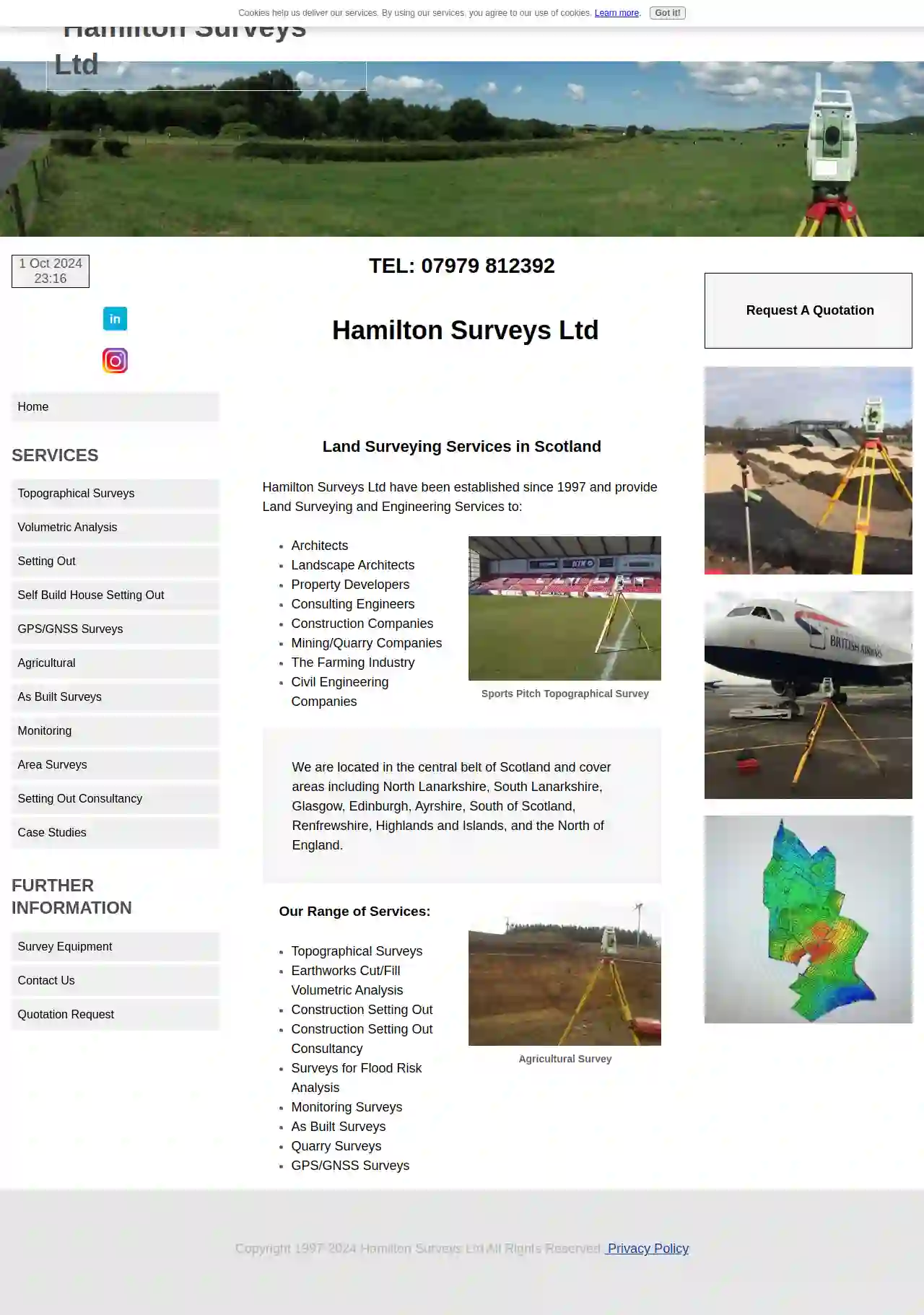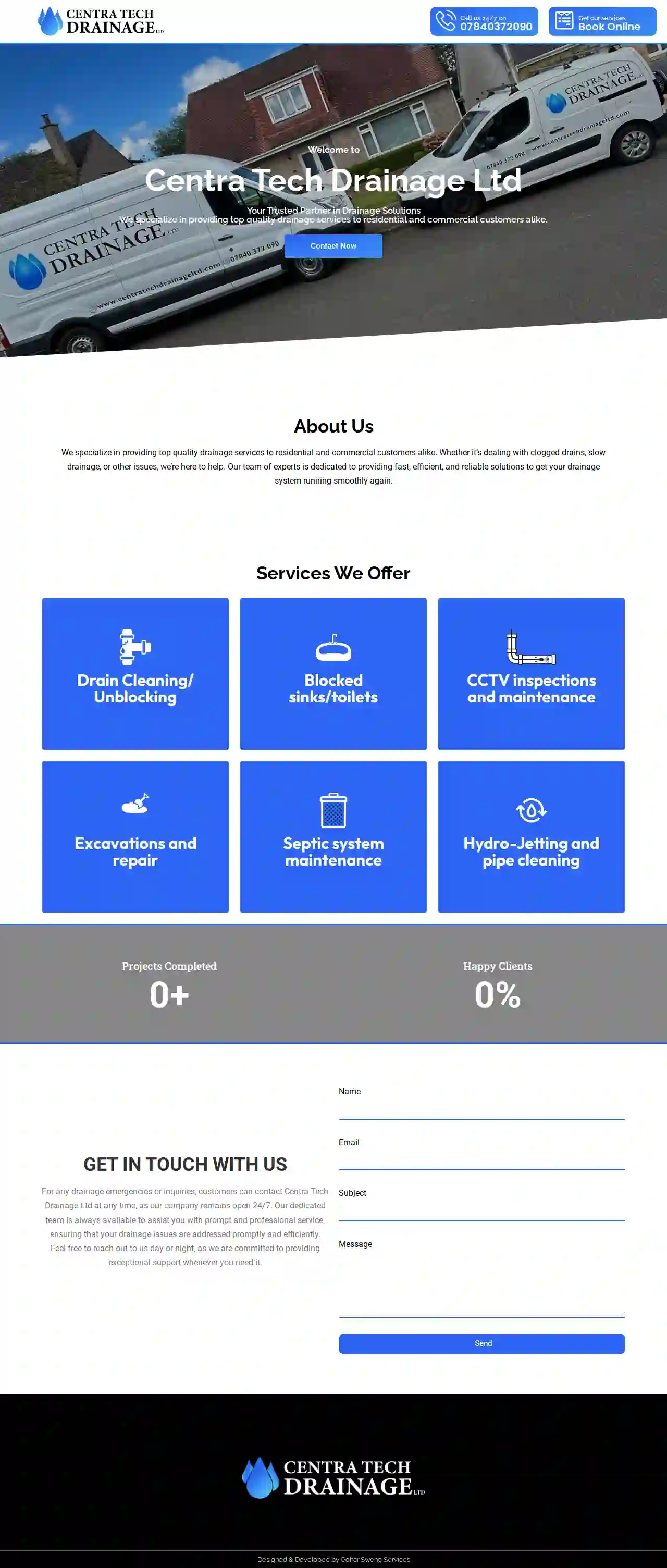Excavation Contractors Carluke
Find the best Excavating Contractor in Carluke
Get up to 3 Excavation Companies quotes for your project today! Compare profiles, reviews, accreditations, portfolio, etc... and choose the best deal.

Hamilton Surveys Ltd
4.52 reviewsHamilton, GBHamilton Surveys Ltd Hamilton Surveys Ltd has been established since 1997 and provides Land Surveying and Engineering Services to a wide range of clients, including: Sports Pitch Topographical Survey Architects Landscape Architects Property Developers Consulting Engineers Construction Companies Mining/Quarry Companies The Farming Industry Civil Engineering Companies We are located in the central belt of Scotland and cover areas including North Lanarkshire, South Lanarkshire, Glasgow, Edinburgh, Ayrshire, South of Scotland, Renfrewshire, Highlands and Islands, and the North of England.
- Services
- Why Us?
- Gallery
Get Quote
Centra Tech Drainage LTD
59 reviewsHamilton, GBWelcome to Centra Tech Drainage Ltd Your Trusted Partner in Drainage Solutions We specialize in providing top quality drainage services to residential and commercial customers alike. Whether it’s dealing with clogged drains, slow drainage, or other issues, we’re here to help. Our team of experts is dedicated to providing fast, efficient, and reliable solutions to get your drainage system running smoothly again.
- Services
- Why Us?
- Gallery
Get Quote
MDS Landscape and Design Ltd
83 Gartloch Way, Gartcosh, G69 8FD, GBExperienced garden landscapers in Glasgow When it comes to garden landscaping and design, MDS Landscape and Design Ltd is the company to contact. If you are thinking of having your garden landscaped, get in touch by completing our contact form or giving us a call. Here at MDS Landscape and Design Ltd, we have more than 30 years of combined experience in garden landscaping, working with homeowners and commercial clients alike. Based in Glasgow, we work across a wide area, which includes Lanarkshire, West Lothian, Midlothian, and Renfrewshire. Our company is built on the foundation of customer satisfaction, and we approach each project with the same level of care and attention to detail that we would like for our own garden. Whatever type of hard or soft landscaping project you are considering, get in touch with us for a competitive quotation.
- Services
- Why Us?
- Testimonials
- Gallery
Get Quote
Burgh Resin Specialists
Hamilton, GBScotland's Epoxy Resin Surfacing Experts Burgh Resin Specialists are resin surface professionals providing resin bound driveways, rubber crumb flooring and Savoro flooring across Edinburgh, Glasgow, Falkirk, Fife and The Lothians. Working only with premium quality resins produced from traceable UK materials, we are experts in installing resin surfacing that outperforms any others on the market. We are Burgh Resin, specialist resin surfacing suppliers and installers working across Edinburgh, Glasgow, Falkirk, Fife and The Lothians, providing the strongest driveways, external and internal resin surfacing in the UK.
- Services
- Why Us?
- Gallery
Get Quote- CE
CEMEX Hyndford Quarry
Hamilton, GB- Services
- Why Us?
Get Quote - Wi
William Shanks Construction
Hamilton, GB- Services
- Why Us?
Get Quote - No
Northlanarkshire Garden Care
52 reviewsHamilton, GB- Services
- Why Us?
Get Quote - (R
(Road Surfacing) (tarmac Driveways) Lanarkshire Glasgow. Wjt Trades Ltd
4.73 reviewsHamilton, GB- Services
- Why Us?
Get Quote - Ti
Tinto Sand & Gravel Ltd
Hamilton, GB- Services
- Why Us?
Get Quote - Ta
Taylor Wimpey Oakwood Grove
41 reviewsHamilton, GB- Services
- Why Us?
Get Quote
Over 13,059+ Excavation Pros in our network
Our excavation contractors operate in Carluke and surroundings!
ExcavationHQ has curated and vetted the Best Excavation Pros in and around Carluke. Find a reliable pro today.
Frequently Asked Questions About Excavation Contractors
- Topsoil Removal: Stripping the fertile topsoil layer from a site, often preserving it for landscaping.
- Trench Excavation: Digging long, narrow trenches for utilities (pipes, cables) or foundations.
- Basement Excavation: Removing earth to create a space for a basement beneath a structure.
- Pool Excavation: Digging a precise hole for installing a swimming pool.
- Roadway Excavation: Removing earth and preparing the ground for road construction.
- Demolition Excavation: Clearing debris and preparing the site after demolition.
- Channel Excavation: Creating channels for drainage or irrigation.
- New Construction: Laying foundations, basements, or underground utilities for new buildings.
- Home Additions: Creating space for new rooms, basements, or extensions.
- Landscaping: Leveling ground, creating slopes, installing retaining walls, or digging for ponds or pools.
- Drainage Improvement: Installing French drains, drainage ditches, or swales to manage water runoff.
- Utility Installation or Repair: Laying new water, sewer, gas, or electrical lines, or repairing existing ones.
- Demolition: Clearing debris and preparing the site after demolishing a structure.
- Excavators: Versatile machines with a bucket, arm, and rotating cab for digging, lifting, and moving earth.
- Backhoes: Similar to excavators but with a digging bucket on the back and a loader bucket on the front, ideal for trenching and smaller excavations.
- Bulldozers: Powerful machines with a large blade for pushing earth, clearing land, and leveling surfaces.
- Skid Steers: Compact and maneuverable loaders with various attachments (buckets, forks) for digging, loading, and grading in tight spaces.
- Trenchers: Specialized machines for digging narrow trenches for utilities.
- Dump Trucks: Vehicles for hauling excavated material to disposal sites.
- Basement Size: The larger the basement, the more excavation is required, increasing the cost.
- Soil Type: Excavating rocky or dense clay soil is generally more expensive than loose soil.
- Accessibility: Difficult-to-access sites might require specialized equipment or more labor, driving up costs.
- Foundation Type: The chosen foundation type (full basement, crawl space, slab) affects excavation needs.
- Underpinning: If underpinning (strengthening existing foundations) is necessary, it significantly increases costs.
- Disposal Fees: Hauling excavated soil to disposal sites adds to the overall expense.
What are the different types of excavation?
How do I know if I need excavation for my project?
What equipment is used for excavation?
How much does it cost to excavate a basement?
What are the different types of excavation?
- Topsoil Removal: Stripping the fertile topsoil layer from a site, often preserving it for landscaping.
- Trench Excavation: Digging long, narrow trenches for utilities (pipes, cables) or foundations.
- Basement Excavation: Removing earth to create a space for a basement beneath a structure.
- Pool Excavation: Digging a precise hole for installing a swimming pool.
- Roadway Excavation: Removing earth and preparing the ground for road construction.
- Demolition Excavation: Clearing debris and preparing the site after demolition.
- Channel Excavation: Creating channels for drainage or irrigation.
How do I know if I need excavation for my project?
- New Construction: Laying foundations, basements, or underground utilities for new buildings.
- Home Additions: Creating space for new rooms, basements, or extensions.
- Landscaping: Leveling ground, creating slopes, installing retaining walls, or digging for ponds or pools.
- Drainage Improvement: Installing French drains, drainage ditches, or swales to manage water runoff.
- Utility Installation or Repair: Laying new water, sewer, gas, or electrical lines, or repairing existing ones.
- Demolition: Clearing debris and preparing the site after demolishing a structure.
What equipment is used for excavation?
- Excavators: Versatile machines with a bucket, arm, and rotating cab for digging, lifting, and moving earth.
- Backhoes: Similar to excavators but with a digging bucket on the back and a loader bucket on the front, ideal for trenching and smaller excavations.
- Bulldozers: Powerful machines with a large blade for pushing earth, clearing land, and leveling surfaces.
- Skid Steers: Compact and maneuverable loaders with various attachments (buckets, forks) for digging, loading, and grading in tight spaces.
- Trenchers: Specialized machines for digging narrow trenches for utilities.
- Dump Trucks: Vehicles for hauling excavated material to disposal sites.
How much does it cost to excavate a basement?
- Basement Size: The larger the basement, the more excavation is required, increasing the cost.
- Soil Type: Excavating rocky or dense clay soil is generally more expensive than loose soil.
- Accessibility: Difficult-to-access sites might require specialized equipment or more labor, driving up costs.
- Foundation Type: The chosen foundation type (full basement, crawl space, slab) affects excavation needs.
- Underpinning: If underpinning (strengthening existing foundations) is necessary, it significantly increases costs.
- Disposal Fees: Hauling excavated soil to disposal sites adds to the overall expense.